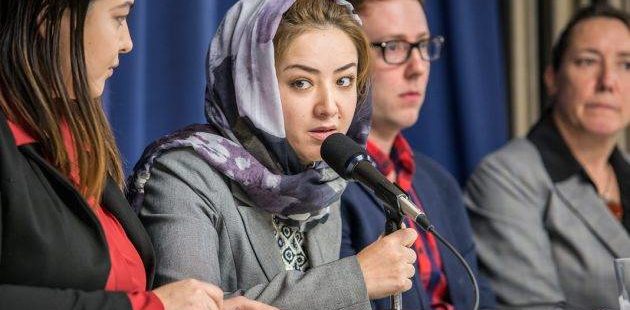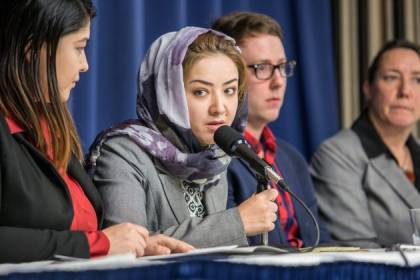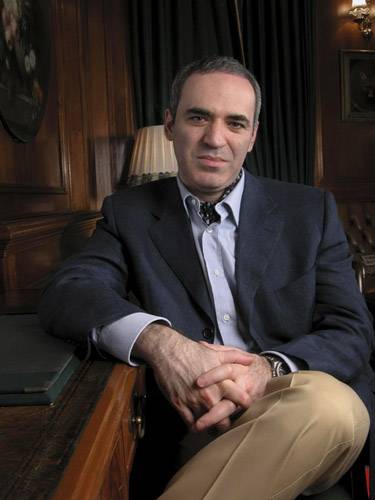

It was an honor to create and teach this Frontlines of Freedom course at @JohnsHopkins last week with @Renew_Democracy and @UrielEpshtein. The students were engaged and impressed with our dissident guests. My comments in the story here: https://t.co/kruXAnvCyV
— Garry Kasparov (@Kasparov63) January 27, 2022
This article is a reprint. You can see the original at Johns Hopkins University.
By Rachel Wallach
“During the last week of Intersession, about two dozen Hopkins undergraduates had front row seats as four prominent dissidents shared their experiences with oppression and their observations on threats to democracy around the world.
The course, Frontlines of Freedom, was led by none other than former world chess champion, pro-democracy advocate, and chair of the Renew Democracy Initiative Garry Kasparov. Offered by the SNF Agora Institute, it was designed to shed light on the anti-democratic trends that most Americans are just beginning to understand by tapping into the perspectives of dissidents who have fought those trends globally for decades.
“We were very excited that the SNF Agora Institute was able to offer Johns Hopkins students the opportunity to take a course with Garry Kasparov, who is himself such a significant voice in the global fight for democracy,” said Hahrie Han, director of the SNF Agora Institute. “Bringing our students into direct conversation with dissidents from oppressive regimes around the world was invaluable for their understanding of just how high the stakes are for democracy and activism—in the dissidents’ home countries and here in the United States.”
In one session, Mihrigul Tursun of China, a former Uyghur detainee, described the experience of being sent to a “reeducation camp” in Xinjiang. Originally from Xinjiang, Tursun was living in Egypt and had returned to the northwestern China city to visit her parents in 2015, when officials detained her and separated her from her eight-week-old triplets. When she was released three months later, she was told that one of her sons had died.

Officials confiscated Tursun’s passport, preventing her from leaving China. In 2017, she was placed in detention again, where she lived in a cell so crowded that she and 50 other women slept in shifts and spent the rest of the time standing. During the year or so she spent there, she watched nine detainees die. After diplomats from the Egyptian Embassy in Beijing helped secure her release in 2018, she and her two surviving children moved to Virginia, where they live today.
“I would like you to be my advocate and my people’s advocate using your freedom,” Tursun said in response to a question about what message she would like to send. She said her detainers often told the prisoners that no one cared about them or their experience. “I expect you to show the Chinese that you do care,” she said.
In addition to Tursun, dissident guests included Leopoldo López of Venezuela, jailed for political opposition to the dictatorships of Hugo Chavez and Nicolas Maduro; Masij Alinejad of Iran, a journalist-activist pursued by the Iranian regime for her campaign against mandatory hijab; and Pastor Evan Mawarire of Zimbabwe, the creator of the “This Flag” campaign that helped unseat dictator Robert Mugabe, and who was arrested and harassed by current strongman Emmerson Mnangagwa.
“My thanks to Johns Hopkins, the SNF Agora Institute, and of course the students,” Kasparov said. “It would have been easy for young students to be overwhelmed by the powerful stories of our guest lecturers, all dissidents who have fought the most painful battles for basic human rights in their home countries. But the students’ questions and essays showed that many of them are ready and willing to engage these difficult issues of democracy and how to protect its essential ingredients at home and abroad. There’s a lot of nuance, but the first challenge is to agree that there’s a problem, and that fixing the system is necessary, not tearing it down. The stories and activism and organizing of our dissident guests impressed upon everyone how dangerous it is to take democracy for granted, even in the greatest democracy of all.”
Each day began with a guest discussing his or her experiences, followed by questions and discussion. Readings and written assignments encouraged students to consider topics including the nature of democracy, its ongoing global decline, and building a coalition against illiberal forces; the myths of the stable or benevolent dictatorship; the additional repression of women and minorities in authoritarian states; what the U.S. and other democracies must learn from the decay and collapse of democracy elsewhere; and participation and activism in civil society as the key to fighting hyper-partisanship and misinformation.
“I was interested in taking the course because I wanted to gain a better understanding of authoritarianism and democratic backsliding,” said Emma Vengosh Weinthal, a first-year student in the Krieger School. “I was excited that the course would provide an opportunity to learn from Mr. Kasparov and to hear from political dissidents from across the world.”

“The course was really eye-opening, as we were able to meet so many incredible and inspiring guest speakers,” agreed Jeffrey Guo, a sophomore majoring in neuroscience. “They really made me aware of the issues happening around the world and how lucky we are to have the things many take for granted. I took this class because Mr. Kasparov is well known for his chess career, but I wanted to see how someone like him views social issues and can really bring a unique perspective.”
Among the course’s key messages was the idea that we in the U.S. can both learn from understanding oppressive regimes around the world, and take steps to resist them and to protect our own democracy. For example, many batteries, computer components, clothes, and agricultural products are manufactured in China with enslaved Uyghur labor, pointed out Nury Turkel, a Uyghur-American lawyer and activist who joined Tursun’s session, and consumer activism in the form of buying power can pressure businesses to behave more ethically.
“Lending your voice is the least that you can do,” Turkel said. “In politics, you have to create an environment to make politicians feel uncomfortable not to act. Democracy is under threat. This is about our future. If we let this continue and expand, this will affect civil liberties, democratic rights, and privacy all around the world.”
Kasparov, who was born in Baku, Azerbaijan, in the Soviet Union in 1963, was one of the first prominent Soviets to call for democratic reforms. He retired from professional chess in 2005 to join the Russian pro-democracy movement, and was named chair of the global Human Rights Foundation in 2012. He currently serves as chair of Renew Democracy Initiative, a nonprofit that promotes democratic principles and civic behavior in the public sphere.
RDI’s director, Uriel Epshtein, helped moderate class discussions. At the end of the course, he challenged the students to carry the perspectives they had discovered into their future endeavors.
“What all the guests have in common is a belief that freedom matters, democracy matters, and everyone should have the right to engage in society without having to fear prison or social ostracism,” Epshtein said. “I want to encourage all of you to think openly about different perspectives, be open to different points of view, and not immediately shut down someone who disagrees with you. Being able to engage constructively with one another really matters.”
RDI plans to build the course into a model that it can bring to universities around the country. The intersession version showed that such a model can be successful, and that its teachings are essential in offering students the context they need to understand and defend democracy, Kasparov said.
“I know everyone isn’t going to become an activist or politician,” Kasparov said. “And America isn’t Russia. But the lesson is that we all must be active participants for democracy to work, or the extremes take over. Having doctors and engineers who are also invested in democracy and politics is crucial. I hope this course can become a model, a template, for others, with Johns Hopkins and SNF Agora leading the way. Just as important as civics, we need to relearn the elements of trust and the common good that make democracy work. We have huge problems to solve in America, especially inequality, which has only gotten worse during the pandemic. We cannot solve those problems unless we agree on a fundamental framework of empowering people. And for all of democracy’s problems, it’s far better than anything else and the only way forward.”

